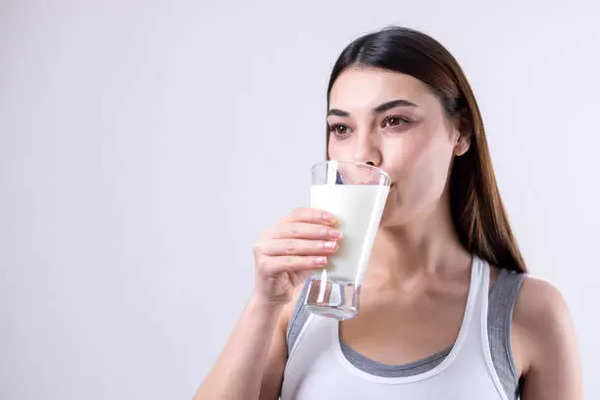Myth or reality: Drinking milk increases hair growth? – The Times of India

Hair growth is a concern that affects people of all ages and backgrounds. From hair care products to diet choices, many factors are believed to influence the rate of hair growth. One such commonly heard piece of advice is that drinking milk can increase hair growth. With the abundance of milk’s nutritional benefits, it’s easy to see why this claim might have taken hold. But is it a myth, or is there some truth behind it? Let’s dive into the science behind this popular belief.
The nutritional power of milk
Milk is often regarded as one of the most nutrient-dense foods available, packed with essential vitamins and minerals. When consumed, it provides a variety of nutrients that are beneficial for the body, including calcium, protein, vitamin D, and B vitamins like B12. These nutrients are integral for overall health, and some have been linked to better skin, nails, and hair health. But does this mean drinking milk directly leads to faster hair growth? Let’s explore.
Milk’s protein content and hair growth
One of the most talked-about benefits of milk for hair growth is its protein content. Hair is made primarily of keratin, a protein that is produced by hair follicles. Protein is essential for healthy hair

growth, and a deficiency in it can lead to hair thinning or even hair loss.
Milk is rich in casein and whey protein, both of which are high-quality proteins that the body can easily absorb. These proteins provide the building blocks necessary for keratin production. Therefore, in theory, consuming milk could help provide the protein your body needs to produce strong, healthy hair.
However, while protein is essential for hair growth, it is important to note that excessive intake of protein does not necessarily lead to faster hair growth. Hair growth is a complex process influenced by genetics, hormonal balance, and overall health. Simply drinking more milk than your body needs won’t magically accelerate hair growth.
Vitamins in milk that support healthy hair
Apart from protein, milk also contains several vitamins that play a crucial role in maintaining healthy hair. These include:
Vitamin D: This vitamin is vital for healthy hair follicles and has been shown to support hair growth. Some studies have linked a deficiency in vitamin D to hair thinning or conditions like alopecia (a type of hair loss).
B Vitamins: Milk is a source of essential B vitamins, including vitamin B12, which is important for overall hair health. These vitamins help in the production of red blood cells, which in turn ensure that the hair follicles receive adequate oxygen and nutrients.
Vitamin A: Another important vitamin for hair health, vitamin A helps in the production of sebum, the natural oil that moisturises the scalp and keeps hair healthy.
However, while these vitamins are important for hair health, drinking milk alone will not automatically provide your body with enough of these nutrients to see a noticeable difference in hair growth. A balanced diet that includes a variety of nutrient-rich foods is key to promoting optimal hair health.
Calcium’s role in hair health
Milk is perhaps best known for its high calcium content, which is crucial for bone health. But calcium also plays a role in overall body functions, including hair growth. Calcium helps to regulate the activity of various enzymes involved in hair follicle health and growth.
However, just as with protein, calcium alone is not a magic solution for boosting hair growth. In fact, an imbalance in calcium levels, whether too high or too low, can actually lead to hair issues. Therefore, while calcium is important for hair health, it should be consumed as part of a balanced, well-rounded diet that meets all your body’s nutritional needs.
The link between hormones and hair growth
Hormones play a significant role in the growth and shedding of hair. Milk contains hormones, such as estrogen and progesterone, which are naturally found in the milk produced by cows. Some studies have raised concerns that consuming milk might disrupt the body’s hormonal balance, particularly if someone consumes milk that contains higher levels of hormones due to how cows are raised.

For individuals who are already dealing with hormone imbalances that affect hair growth (such as PCOS or androgenic alopecia), it is important to approach dairy consumption with caution. In such cases, excess dairy could potentially exacerbate hair loss. However, more research is needed to fully understand the link between milk’s hormones and human hair growth.
The bottom line: Does drinking milk really help hair growth?
While drinking milk is undoubtedly beneficial for overall health, the claim that it directly leads to faster or thicker hair growth is likely more of a myth than a reality. Hair growth is influenced by a variety of factors, including genetics, hormonal health, and overall nutrition. While milk can provide the body with important nutrients like protein, vitamins, and minerals that contribute to hair health, it is not a miracle solution for promoting hair growth on its own.
If you are looking to boost your hair growth, the best approach is to maintain a well-balanced diet, stay hydrated, and manage stress levels. Incorporating a variety of nutrient-rich foods, including lean proteins, healthy fats, and a range of fruits and vegetables, will provide your body with the building blocks necessary for optimal hair growth. Additionally, practicing good hair care habits, such as avoiding excessive heat styling and using gentle, nourishing hair products, can help keep your hair strong and healthy.
Drinking milk can certainly support healthy hair due to its protein and vitamin content, but it should be seen as part of a broader healthy lifestyle rather than a quick fix for hair growth. For those struggling with hair loss or poor hair health, it’s always a good idea to consult with a healthcare provider or nutritionist to determine the best course of action for improving hair growth based on your specific needs.




